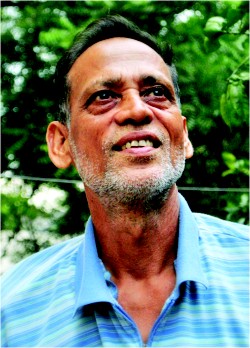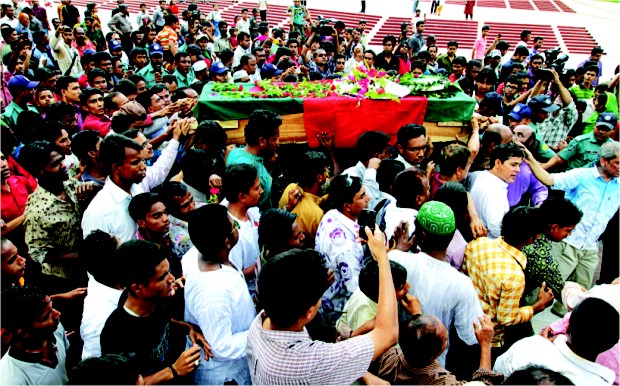|
Post Campus
The Day, The Music Died- An Ode to Guru Azam Khan
Asrar Chowdhury
Years before the term “fusion” was coined, Azam Khan and his Mates were blending Bangla Folk and Sufi masala with Western spices to cook the foundations of what today is known as Bangla Rock. The 1950s-1970s was a golden time for popular music all over the world. Bangla popular music joined this bandwagon relatively late- in the closing years of the 1960s. But when it did- it cast Bangladesh into a spell that still carries on mesmerising the hearts of listeners and followers almost half a century later.
 |
Azam Khan. Photo: Star File |
Born on February 28, 1950 at Azimpur Government Colony, Mohammad Mahbubul Huq Khan aka Azam Khan was introduced to music through his Mother, Zobaida Begum. His Father, Mohammad Aftabuddin Khan was a government Officer. In 1967, Azam Khan became a member of Kranti Shilpi Goshthi. The group sang protest songs against the inequalities Bangladesh faced at the hands of the rulers in West Pakistan. They sang Janatar Sangram Cholbei; Bicharpati Tomar Bichar and other songs that later became anthems of Swadhin Bangla Betar.
Soon Bangladesh was at a crossroads - 1971- The Bangladesh Liberation War started. Like many, Azam Khan found himself joining the Beer Mukti Bahini to defend the honour and pride of a nation that refused to surrender in spite of losing three million lives in just 266 days at 7.83 lives per minute. His Father's orders were- “Don't return until you've freed the country”. First in Sector 2 receiving training from Mela Ghar at Agartala in Tripura, Azam Khan also fought in the front as a part of the Trimohini operation near Madartek where the Bir Mukti Bahini defeated the Pak Army. Azam Khan's voice and music inspired fellow Freedom fighters.
In a new Bangladesh, Azam Khan formed the band Uchcharon in 1972 with their first live programme at Notre Dame College. Their breakthrough came the same year with Eto Shundor Duniyai and Char Kalema on BTV, which became instant hits and anthems of a new generation. In collaboration with Feeroze Shain, Ferdous Wahid, Fakir Alamgir, Pilu Momtaz and others, Azam Khan and Mates were unknowingly sowing the seeds of a new genre- Bangla Rock. Small Wonder! Such a genre would also be the first in South Asia. It was Azam Khan who stood out with his ingenuity by keeping true to the Folk and Sufi roots of Bangla music while blending with Western Rhythm and Blues. The definitive Jeebone Kichhu Pabo Na broke out in 1974/75. This single was well ahead of its time in Bangladesh and South Asia. There was now no turning back- a new beat; a new rhythm; and a new soul and spirit had come for the staying. Bangla Rock was born.
The beauty of Rock is its universal youthful spirit. Like Chuck Berry, Azam Khan delivered anthems: Bangladesh; Alal O Dulal; Ore Saleka, Ore Maleka; High Court-er Mazare; Abhimani and many more that spoke of the youth and immortalised names and places of Bangladesh. Chuck Berry influenced The Beatles and Rolling Stones. Azam Khan was also a musician's musician. He was the musician to whom his contemporaries and future generation Rock Musicians have always looked up to. Azam Khan with his ingenuity and down to earth personality and life style 'earned' the title Guru- an acknowledgment no formal institution could have ever matched because it is kissed with the love, respect and gratitude of listeners and musicians of Bangladesh.

People from all walks of life come together to pay their last respects. Photo: Star File
Personalities and talents like Guru Azam Khan come once in a few generations. They come as a silent Messiah to guide and enlighten people. Guru Azam Khan goes one step ahead. He responded to the call of his nation when his nation was at a crossroads. He then took a profession with a passion full of devotion- a rarity these days! Through devotion and ingenuity, Guru Azam Khan gave birth to Bangla Rock, but remained aloof from superstardom. In a time and age when the society runs a rat race, Guru Azam Khan lead a very humble life playing sport, teaching young kids how to swim and spending time with his family. He never chased material wealth or any formal recognition. The Guru of Bangla Rock will remain a silent shadow- a Guardian Angel- with all the bodies of Rock musicians for as long as Bangla Rock is alive.
From 1971 Azam Khan has indeed been The Guru. His entire persona reflects the spirit of 1971- rebellion, freedom and the love for the people of Bangladesh. And thus Guru Azam Khan has remained evergreen and ever relevant for four decades from the generation that experienced the creation of Bangladesh to today's youth. Very few personalities in Bangladesh have had such an everlasting impact in any form of artistic expression. Nay! That day, the music didn't die. From now, it will sing and ring in another form- that's all. Guru, Rest in Peace!
(The author teaches economic theory at Jahangirnagar University and North South University.)
|
